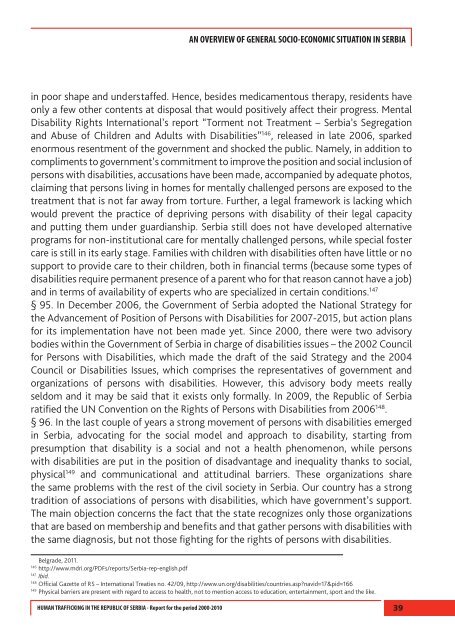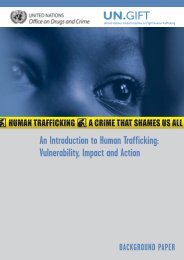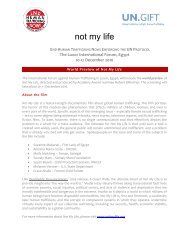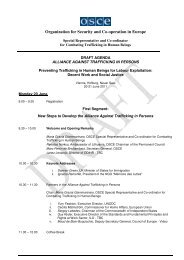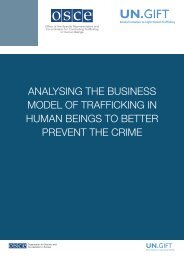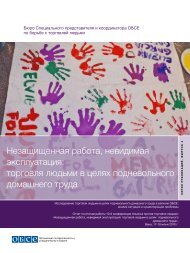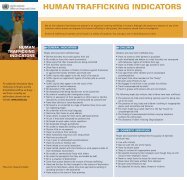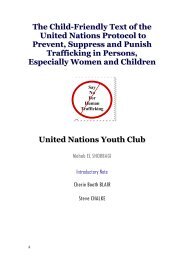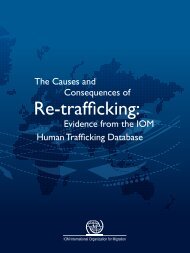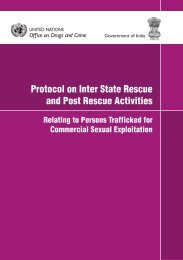- Page 1: HUMAN TRAFFICKING IN THE REPUBLIC O
- Page 4 and 5: HUMAN TRAFFICKING IN THE REPUBLIC O
- Page 6 and 7: TABLE OF CONTENTS LIST OF ABBREVIAT
- Page 8 and 9: III.2.2.4.4. Users of Commercial Se
- Page 10 and 11: III.5.1. Legal Analysis . . . . . .
- Page 12 and 13: LIST OF ABBREVIATIONS AND ACRONYMS
- Page 14 and 15: PREFACE You have before you a Repor
- Page 16 and 17: GENERAL INFORMATION ABOUT SERBIA I.
- Page 18 and 19: POLITICAL, ECONOMIC AND SOCIAL SITU
- Page 20 and 21: HUMAN RIGHTS IN SERBIA § 14. Altho
- Page 22 and 23: WOMEN IN SERBIA institution of ombu
- Page 24 and 25: WOMEN IN SERBIA women, although thi
- Page 26 and 27: WOMEN IN SERBIA women won around 11
- Page 28 and 29: WOMEN IN SERBIA participatory proce
- Page 30 and 31: CHILDREN IN SERBIA § 53. Although
- Page 32 and 33: CHILDREN IN SERBIA whereby this fig
- Page 34 and 35: CHILDREN IN SERBIA school. Although
- Page 36 and 37: PERSONS WITH DISABILITIES IN SERBIA
- Page 38 and 39: PERSONS WITH DISABILITIES IN SERBIA
- Page 42 and 43: NATIONAL MINORITIES IN SERBIA I.7.
- Page 44 and 45: NATIONAL MINORITIES IN SERBIA care,
- Page 46 and 47: NONGOVERNMENTAL ORGANIZATIONS IN SE
- Page 48 and 49: NONGOVERNMENTAL ORGANIZATIONS IN SE
- Page 50 and 51: NONGOVERNMENTAL ORGANIZATIONS IN SE
- Page 52 and 53: HUMAN TRAFFICKING AS A GLOBAL PHENO
- Page 54 and 55: TRAFFICKING IN HUMAN BEINGS IN SERB
- Page 56 and 57: TRAFFICKING IN HUMAN BEINGS IN SERB
- Page 58 and 59: ANTI-TRAFFICKING ACTIVITIES AND MEC
- Page 60 and 61: ANTI-TRAFFICKING ACTIVITIES AND MEC
- Page 62 and 63: HOW TO DEAL WITH TRAFFICKING: INTER
- Page 64 and 65: HOW TO DEAL WITH TRAFFICKING: INTER
- Page 66 and 67: HOW TO DEAL WITH TRAFFICKING: INTER
- Page 68 and 69: HOW TO DEAL WITH TRAFFICKING: INTER
- Page 70 and 71: HOW TO DEAL WITH TRAFFICKING: INTER
- Page 72 and 73: ARTICLES 1-5 III.2. Protocol to Pre
- Page 74 and 75: ARTICLES 1-5 Article 5 Criminalizat
- Page 76 and 77: ARTICLES 1-5 2. Each Party shall en
- Page 78 and 79: ARTICLES 1-5 2. Each Party may, at
- Page 80 and 81: ARTICLES 1-5 • Criminal offences
- Page 82 and 83: ARTICLES 1-5 § 217. It is signific
- Page 84 and 85: ARTICLES 1-5 ACTION Palermo Protoco
- Page 86 and 87: ARTICLES 1-5 PURPOSE Palermo Protoc
- Page 88 and 89: ARTICLES 1-5 III.2.1.1.5 The Crimin
- Page 90 and 91:
ARTICLES 1-5 III.2.1.2.1 Criminaliz
- Page 92 and 93:
ARTICLES 1-5 three months to five y
- Page 94 and 95:
ARTICLES 1-5 § 262. If, in the cou
- Page 96 and 97:
ARTICLES 1-5 § 274. If there are c
- Page 98 and 99:
ARTICLES 1-5 • if the accused has
- Page 100 and 101:
ARTICLES 1-5 § 294. This Law defin
- Page 102 and 103:
ARTICLES 1-5 § 305. As to the proc
- Page 104 and 105:
ARTICLES 1-5 investigative teams; t
- Page 106 and 107:
ARTICLES 1-5 III.2.1.2.15 Protectio
- Page 108 and 109:
ARTICLES 1-5 cooperation let us men
- Page 110 and 111:
ARTICLES 1-5 and forcing a juvenile
- Page 112 and 113:
ARTICLES 1-5 III.2.2. Practice Anal
- Page 114 and 115:
ARTICLES 1-5 3. Who has left the pl
- Page 116 and 117:
ARTICLES 1-5 been avoided being dep
- Page 118 and 119:
ARTICLES 1-5 of Foreigners Act, i.e
- Page 120 and 121:
ARTICLES 1-5 rejected the notion th
- Page 122 and 123:
ARTICLES 1-5 were condemning and st
- Page 124 and 125:
ARTICLES 1-5 III.2.2.4.4. Users of
- Page 126 and 127:
ARTICLES 1-5 agencies which were, a
- Page 128 and 129:
ARTICLES 1-5 § 393. Soon, advertis
- Page 130 and 131:
ARTICLES 1-5 human trafficking and
- Page 132 and 133:
ARTICLES 1-5 III.2.2.6. Human Traff
- Page 134 and 135:
ARTICLES 1-5 inspired by a specific
- Page 136 and 137:
ARTICLES 1-5 while novelty in the p
- Page 138 and 139:
ARTICLES 1-5 existing provisions on
- Page 140 and 141:
ARTICLES 1-5 sentenced for human tr
- Page 142 and 143:
ARTICLES 1-5 21 Year Imprisonment f
- Page 144 and 145:
ARTICLES 1-5 the fact that it did n
- Page 146 and 147:
ARTICLES 1-5 Aleksandar Putnik, wit
- Page 148 and 149:
ARTICLES 1-5 some of the victims ar
- Page 150 and 151:
ARTICLES 1-5 helpers, the Tomić br
- Page 152 and 153:
ARTICLES 1-5 BELGRADE - In Blace ne
- Page 154 and 155:
ARTICLES 1-5 you convict them to lo
- Page 156 and 157:
ARTICLES 1-5 III.2.2.11. Setting Up
- Page 158 and 159:
ARTICLES 1-5 than one month in the
- Page 160 and 161:
ARTICLES 1-5 The Novi Sad District
- Page 162 and 163:
ARTICLES 1-5 technical assistance a
- Page 164 and 165:
ARTICLES 1-5 judge of the Šabac Di
- Page 166 and 167:
ARTICLES 1-5 the respondents said t
- Page 168 and 169:
ARTICLE 6 Janković sent the report
- Page 170 and 171:
ARTICLE 6 CoE Article 10 Identifica
- Page 172 and 173:
ARTICLE 6 CoE Article 15 Compensati
- Page 174 and 175:
ARTICLE 6 § 468. For the purpose o
- Page 176 and 177:
ARTICLE 6 that the trial is closed,
- Page 178 and 179:
ARTICLE 6 arrest and charge in a la
- Page 180 and 181:
ARTICLE 6 without permanent or temp
- Page 182 and 183:
ARTICLE 6 could have access to the
- Page 184 and 185:
ARTICLE 6 at jobs detrimental to th
- Page 186 and 187:
ARTICLE 6 the first hearing of the
- Page 188 and 189:
ARTICLE 6 III.3.1.4.6. Ensuring a S
- Page 190 and 191:
ARTICLE 6 III.3.2.Practice Analysis
- Page 192 and 193:
ARTICLE 6 § 549. Still, positive e
- Page 194 and 195:
ARTICLE 6 Institute for Social Prot
- Page 196 and 197:
ARTICLE 6 Participating in the Crim
- Page 198 and 199:
ARTICLE 6 However, in spite of all
- Page 200 and 201:
ARTICLE 6 Pending criminal trial be
- Page 202 and 203:
ARTICLE 6 In 2005, a few months aft
- Page 204 and 205:
ARTICLE 6 § 575. The term “re-in
- Page 206 and 207:
ARTICLE 6 III. 3.2.3.1. Evolution o
- Page 208 and 209:
ARTICLE 6 Belgrade. The Mobile Team
- Page 210 and 211:
ARTICLE 6 order to adjust preventio
- Page 212 and 213:
ARTICLE 6 in direct work with traff
- Page 214 and 215:
ARTICLE 6 for every presumed traffi
- Page 216 and 217:
ARTICLE 6 instead of coordination,
- Page 218 and 219:
ARTICLE 6 including the doubt wheth
- Page 220 and 221:
ARTICLE 6 at identification and lat
- Page 222 and 223:
ARTICLE 6 advice from legal special
- Page 224 and 225:
ARTICLE 6 In November 2004, a 12-ye
- Page 226 and 227:
ARTICLE 6 In the end, IOM covered t
- Page 228 and 229:
ARTICLE 6 professional psychologica
- Page 230 and 231:
ARTICLE 6 At the beginning of Febru
- Page 232 and 233:
ARTICLE 6 list of problems is much
- Page 234 and 235:
ARTICLE 6 rejected and useless, he
- Page 236 and 237:
ARTICLE 6 current condition, they r
- Page 238 and 239:
ARTICLE 6 • Child trafficking for
- Page 240 and 241:
ARTICLE 6 § 678. It should certain
- Page 242 and 243:
ARTICLE 6 of the shelter in which t
- Page 244 and 245:
ARTICLE 6 III.3.2.4.2. Special Need
- Page 246 and 247:
ARTICLE 6 perform all procedural ac
- Page 248 and 249:
ARTICLE 6 § 967. At meetings, both
- Page 250 and 251:
ARTICLE 6 to come home because she
- Page 252 and 253:
ARTICLE 6 social welfare center reg
- Page 254 and 255:
ARTICLE 6 their families. 414 Child
- Page 256 and 257:
ARTICLE 6 representatives of the Mo
- Page 258 and 259:
ARTICLE 6 In September 2003, a citi
- Page 260 and 261:
ARTICLE 6 seizure and confiscation
- Page 262 and 263:
ARTICLE 6 damage and litigation cos
- Page 264 and 265:
ARTICLE 7 III.4. Protocol to Preven
- Page 266 and 267:
ARTICLE 7 purpose intended {Article
- Page 268 and 269:
ARTICLE 7 III.4.2. Practice Analysi
- Page 270 and 271:
ARTICLE 7 § 752. Moreover, “if t
- Page 272 and 273:
ARTICLE 8 III.5. Protocol to Preven
- Page 274 and 275:
ARTICLE 8 • Officials are require
- Page 276 and 277:
ARTICLE 8 shall be obliged to act i
- Page 278 and 279:
ARTICLE 8 are to see if in the near
- Page 280 and 281:
ARTICLE 8 further communication bet
- Page 282 and 283:
ARTICLE 8 § 785. The general absen
- Page 284 and 285:
ARTICLE 8 am punished after everyth
- Page 286 and 287:
ARTICLE 9 III.6. Protocol to Preven
- Page 288 and 289:
ARTICLE 9 countries of origin, tran
- Page 290 and 291:
ARTICLE 9 sub-objectives defined wi
- Page 292 and 293:
ARTICLE 9 governmental and internat
- Page 294 and 295:
ARTICLE 9 director of the Institute
- Page 296 and 297:
ARTICLE 9 envisages different preve
- Page 298 and 299:
ARTICLE 9 § 836. In December 2006,
- Page 300 and 301:
ARTICLE 9 young people as one rathe
- Page 302 and 303:
ARTICLE 9 Although not directly and
- Page 304 and 305:
ARTICLE 9 significant progress and
- Page 306 and 307:
ARTICLE 9 and NGOs exists 492 . How
- Page 308 and 309:
ARTICLE 9 of poverty in 2008 and 20
- Page 310 and 311:
ARTICLE 9 Chart III.6.1.9.1. Previo
- Page 312 and 313:
ARTICLE 9 310 YEAR NO. OF ISSUED PE
- Page 314 and 315:
ARTICLE 9 persons whom we identifie
- Page 316 and 317:
ARTICLE 10 § 906. As far as Serbia
- Page 318 and 319:
ARTICLE 10 CoE Article 29 Specialis
- Page 320 and 321:
ARTICLE 10 Strategy to Combat Traff
- Page 322 and 323:
ARTICLE 10 Special attention was pa
- Page 324 and 325:
ARTICLE 10 § 924. Between 28 May a
- Page 326 and 327:
ARTICLE 10 § 930. Police cooperati
- Page 328 and 329:
ARTICLE 10 In 2005, proceedings for
- Page 330 and 331:
ARTICLE 10 strengthen further coope
- Page 332 and 333:
ARTICLE 10 section for Criminal Law
- Page 334 and 335:
ARTICLE 10 § 954. One objection th
- Page 336 and 337:
ARTICLE 11 all three differ by thei
- Page 338 and 339:
ARTICLE 11 3. Where appropriate, an
- Page 340 and 341:
ARTICLE 11 to disembark to a harbor
- Page 342 and 343:
ARTICLE 11 do not need visa for sta
- Page 344 and 345:
ARTICLE 11 intend to illegally cros
- Page 346 and 347:
ARTICLE 11 Declaration on the Borde
- Page 348 and 349:
ARTICLES 12 AND 13 acting today? Gr
- Page 350 and 351:
ARTICLES 12 AND 13 CoE Article 9 Le
- Page 352 and 353:
ARTICLES 12 AND 13 New Serbian Pass
- Page 354 and 355:
ARTICLES 12 AND 13 Since June 2010,
- Page 356 and 357:
ARTICLE 14 (2) travel documents, an
- Page 358 and 359:
ARTICLE 14 (2) of non-discriminatio
- Page 360 and 361:
ARTICLE 14 (2) legislative or judic
- Page 362 and 363:
ARTICLE 14 (2) notorious lie. It ha
- Page 364 and 365:
ARTICLES 36 AND 37 III.11. CoE Conv
- Page 366 and 367:
Recommendations for the Harmonizati
- Page 368 and 369:
• Article 231 of the Criminal Pro
- Page 370 and 371:
Protection of Trafficking Victims
- Page 372 and 373:
ASTRA SOS HOTLINE AND DIRECT VICTIM
- Page 374 and 375:
ASTRA SOS HOTLINE AND DIRECT VICTIM
- Page 376 and 377:
ASTRA SOS HOTLINE AND DIRECT VICTIM
- Page 378 and 379:
ASTRA SOS HOTLINE AND DIRECT VICTIM
- Page 380 and 381:
ASTRA SOS HOTLINE AND DIRECT VICTIM
- Page 382 and 383:
ASTRA SOS HOTLINE AND DIRECT VICTIM
- Page 384 and 385:
ASTRA SOS HOTLINE AND DIRECT VICTIM
- Page 386 and 387:
ASTRA SOS HOTLINE AND DIRECT VICTIM
- Page 388 and 389:
ASTRA SOS HOTLINE AND DIRECT VICTIM
- Page 390 and 391:
ASTRA SOS HOTLINE AND DIRECT VICTIM
- Page 392 and 393:
ASTRA SOS HOTLINE AND DIRECT VICTIM
- Page 394 and 395:
ASTRA SOS HOTLINE AND DIRECT VICTIM
- Page 396 and 397:
ASTRA SOS HOTLINE AND DIRECT VICTIM
- Page 398 and 399:
ASTRA SOS HOTLINE AND DIRECT VICTIM
- Page 400 and 401:
ASTRA SOS HOTLINE AND DIRECT VICTIM
- Page 402 and 403:
ASTRA SOS HOTLINE AND DIRECT VICTIM
- Page 404 and 405:
ASTRA SOS HOTLINE AND DIRECT VICTIM
- Page 406 and 407:
MAPS The Consular Offices of the Re
- Page 408 and 409:
MAPS II - Map of Routes Across Serb
- Page 410 and 411:
PERCEPTION AND UNDERSTANDING OF THE
- Page 412 and 413:
PERCEPTION AND UNDERSTANDING OF THE
- Page 414 and 415:
PERCEPTION AND UNDERSTANDING OF THE
- Page 416 and 417:
PERCEPTION AND UNDERSTANDING OF THE
- Page 418 and 419:
THE CASE OF LABOR EXPLOITATION OF T
- Page 420 and 421:
THE CASE OF LABOR EXPLOITATION OF T
- Page 422 and 423:
THE CASE OF LABOR EXPLOITATION OF T
- Page 424 and 425:
THE CASE OF LABOR EXPLOITATION OF T
- Page 426 and 427:
THE CASE OF LABOR EXPLOITATION OF T
- Page 428 and 429:
THE CASE OF LABOR EXPLOITATION OF T
- Page 430 and 431:
THE CASE OF LABOR EXPLOITATION OF T
- Page 432 and 433:
THE CASE OF LABOR EXPLOITATION OF T
- Page 434 and 435:
THE CASE OF LABOR EXPLOITATION OF T
- Page 436 and 437:
THE CASE OF LABOR EXPLOITATION OF T
- Page 438 and 439:
THE CASE OF LABOR EXPLOITATION OF T
- Page 440 and 441:
THE CASE OF LABOR EXPLOITATION OF T
- Page 442 and 443:
THE CASE OF LABOR EXPLOITATION OF T
- Page 444 and 445:
THE CASE OF LABOR EXPLOITATION OF T
- Page 446 and 447:
THE CASE OF LABOR EXPLOITATION OF T
- Page 448 and 449:
THE CASE OF LABOR EXPLOITATION OF T
- Page 450 and 451:
DISCOVERED CASES OF TRAFFICKING AND
- Page 452 and 453:
DISCOVERED CASES OF TRAFFICKING AND
- Page 454 and 455:
DISCOVERED CASES OF TRAFFICKING AND
- Page 456 and 457:
DISCOVERED CASES OF TRAFFICKING AND
- Page 458 and 459:
DISCOVERED CASES OF TRAFFICKING AND
- Page 460 and 461:
ACTIVE ANTI-TRAFFICKING ACTORS IN T
- Page 462 and 463:
ACTIVE ANTI-TRAFFICKING ACTORS IN T
- Page 464 and 465:
ACTIVE ANTI-TRAFFICKING ACTORS IN T
- Page 466 and 467:
ACTIVE ANTI-TRAFFICKING ACTORS IN T
- Page 468 and 469:
ACTIVE ANTI-TRAFFICKING ACTORS IN T
- Page 470 and 471:
ACTIVE ANTI-TRAFFICKING ACTORS IN T
- Page 472 and 473:
ACTIVE ANTI-TRAFFICKING ACTORS IN T
- Page 474 and 475:
ACTIVE ANTI-TRAFFICKING ACTORS IN T
- Page 476 and 477:
Organizing workshops, seminars, for
- Page 478 and 479:
Towards the Schengen White List rep
- Page 480 and 481:
A global alliance agaist forced lab
- Page 482:
Aleksić I., Lukić M., Serbia - Co


